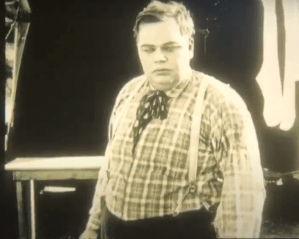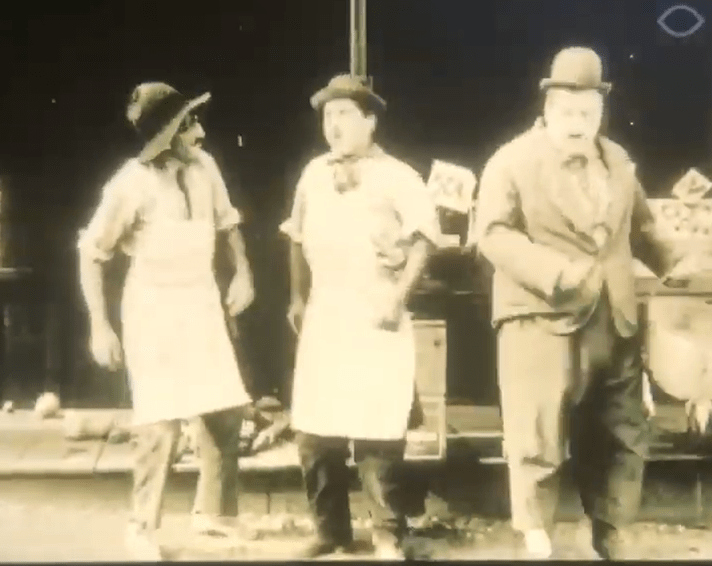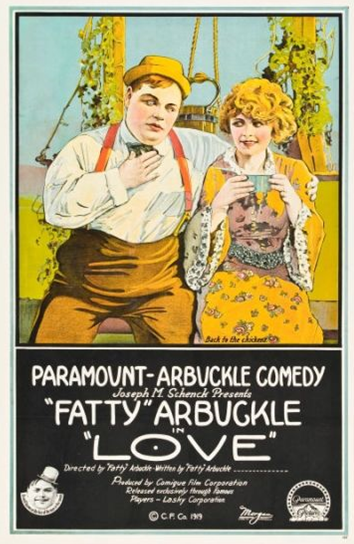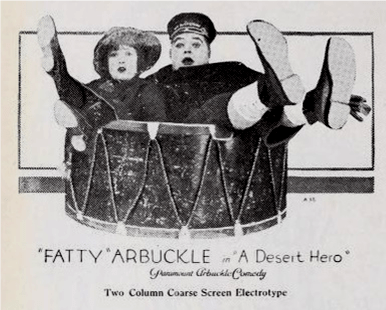To coincide with a showing of the very rare Roscoe Arbuckle short CAMPING OUT on The Silent Comedy Watch Party, here’s a run-down of the overlooked shorts Arbuckle made in 1918 & 1919… the ones that don’t feature Buster Keaton in the cast!
Roscoe Arbuckle’s series of shorts made for the Comique film corporation and released through Paramount in 1917-20, are among his best-known work. Certainly, they are the best represented on DVD. This is almost entirely due to the Keaton factor – the presence of a young Buster in most of the films. This bias is confirmed by the obscurity of the films in which Buster does not appear, made during his military service in 1918-19.
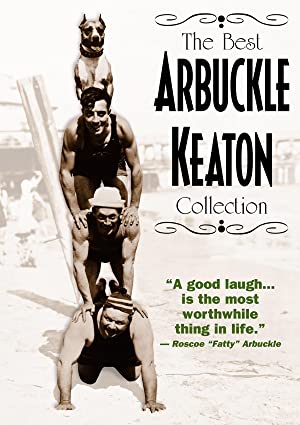
When Keaton was drafted, the Comique series continued with Arbuckle and his regular foil, Al St John. While the popularity of Keaton has ensured that all but one of the Arbuckle-Keatons are now accounted for, the survival rate drops much further for the shorts made in his absence. Only a couple are known to exist, and only one has been restored and released. Details of many of the films are sparse, with a couple remaining mysteries.
Ever since critics first took an interest in Keaton, Arbuckle has always been in his shadow. At worst, the lazy critical opinion is that Arbuckle’s style was crude and unsophisticated, and that the only merit in the films came from Keaton’s input. Silent comedy aficianados know better, of course; nevertheless, an unfortunate legacy of this view is the lack of interest in this bunch of films. Along with their unavailability, this remains in stark contrast to those that came on either side of them.
Let’s take a look at this neglected group of films, hopefully waiting to be rediscovered. Here they are, in order of release:
THE SHERIFF (24th November 1918)
In late 1917, the Arbuckle company had moved to California from the East Coast, partly enticed by the better backgrounds on offer. The desert settings of the west were seen to good advantage in the first film after moving, OUT WEST, and Arbuckle reused the theme in this short.
Arbuckle plays a Sheriff enamoured of the movie heroics of Douglas Fairbanks and William S Hart. After falling asleep and dreaming a dramatic rescue in a Mexican town where He gets the chance to try a real heroic rescue, when his schoolteacher girlfriend Betty is kidnapped by bandit Al.
THE SHERIFF is possibly the most intriguing of all these films, and sounds like it was an amusing little gem. Arbuckle surely got good comic contrast from impersonating Fairbanks and Hart, and THE SHERIFF is perhaps similar to the clever, cliché spoofing Arbuckle-Keaton short MOONSHINE. While OUT WEST had been an exercise in comic savagery, reviews of the time commented that THE SHERIFF was rather more subtle and sophisticated. Here’s a review from Motion Picture News of November 23, 1918:
THE SHERIFF is better by far than anything contributed to the Arbuckle Paramount program. For one thing, it is free from vulgarity & sloppiness. The classic kick shines by its absence. For another, the situations have been developed logically, producing maximum fun out of minimum action.
One of the common misconceptions about Arbuckle is that any sophistication in his films came from Keaton’s input. While there’s no denying that Keaton had big creative input into the films, Arbuckle, rather like Charley Chase, liked to play with different styles and could happily jump from wild gags and slapstick to gentle situation comedy. Some of his earlier Sennett films, made with Mabel Normand, like HE DID AND HE DIDN’T, show a gentle and sophisticated side to Roscoe before Keaton ever appeared on the scene.
Nevertheless, Arbuckle definitely felt the loss of Keaton in his supporting cast, and hired another diminutive comic to take his place: Mario Bianchi (the future Monty Banks). His leading lady in this film is also notable; Betty Compson would become a star in features, her career getting a boost the following year when she appeared with Lon Chaney in THE MIRACLE MAN.
Incidentally, spoofing William S Hart came up again in Keaton’s later short THE FROZEN NORTH. It was an idea contributed by a writer who remained uncredited… Roscoe Arbuckle! In the short, Keaton made a mockery of Hart’s tendency to always have a scene where he cried in his films. Roscoe apparently did the same in THE SHERIFF.
SCRAPS OF PAPER (aka A SCRAP OF PAPER – Autumn 1918)
part of the regular series but made at the same time, this is Arbuckle’s equivalent of Chaplin’s THE BOND. Like that film, it is a propaganda effort designed to promote the Canadian War Bond fundraising effort. As well as each making a promotional film, Chaplin and Arbuckle made public appearances together to promote the loan drive, and newsreel footage of one of these events still exists. Like THE BOND, SCRAPS OF PAPER features our hero coming face to face with the Kaiser (Glen Cavender) and the ‘clown quince’ (Al St John). After mocking the goose-step marching of the Kaiser’s soldiers (one of whom is Monty Banks), Arbuckle tells him that there’s one thing he hasn’t considered, and unleashes a snowstorm of Liberty Bonds which engulf the Germans. Roscoe addresses the audience directly (via intertitle) telling them to do their bit and invest in the Liberty Loan Drive. Not much of a comedy, but an effective piece of propaganda and an interesting historical curio.
CAMPING OUT (5th January 1919)
CAMPING OUT is a rare survivor from this group of films, existing from two incomplete nitrate sources (one Italian print and one from the Netherlands). A composite print has received a number of screenings (most recently on the Silent Comedy Watch Party) and is held at the EYE film institute. Arbuckle again took advantage of the West Coast climate and locations, filming the short on Catalina Island in November 1918. If THE SHERIFF showcased a more subtle side of Arbuckle, then this film returned to the cruder slapstick milieu of films like THE BUTCHER BOY and THE ROUGH HOUSE. Within the first five minutes alone, there are jokes about vomiting, spitting and seagull droppings!
The basic premise of CAMPING OUT recalls FATTY AT CONEY ISLAND, a tale of Arbuckle playing hookey from his wife, and enjoying the freedom by flirting with other men’s wives. Unable to stomach his wife’s dreadful cooking, he escapes for a while, taking the ferry to Catalina for a camping trip. En route, he (inevitably) meets Al St John, and his pretty wife Alice Lake. In the the ensuing tussle Roscoe throws Al overboard. Fatty and Al’s wife proceed to the campsite, where the grizzled, one-legged camp owner is also played by St John. The highlight of the film follows as Roscoe indulges in some of his trademark food preparation gags. Here he demonstrates novel ways of shaving potatoes, and making doughnuts and mashed potatoes with the aid of St John’s wooden leg! Another highlight is his plan to filch food from grocer Monty Banks.
Inevitably, Roscoe’s chickens come to roost as his wife (armed with guns and knives!), Al and Monty all show up for a slapstick battle royale to round out the short.
Though CAMPING OUT is far from Roscoe’s most sophisticated effort, it’s a ton of fun, and the sunny location shooting around Catalina Island and the streets of Avalon only add to the summery, freewheeling tone of the film. Watch the film as part of the Silent Comedy Watch Party live stream here:
THE PULLMAN PORTER (? unfinished/unreleased film)
THE PULLMAN PORTER is a curiosity, an elusive mystery film. The Arbuckle shorts were popular and well publicised, with Paramount often placing full-page ads in the trade papers for them. For THE SHERIFF, we can piece together lots of information, for instance. But for this film, the trail runs cold. So far, I’ve found no reports of the production, no stills, no reviews… nuthin. Nada. Zilch. But, it does have a cited release date, Feb 16. It does seem strange that an Arbuckle short released at this time would receive next to no coverage in the trades.
There has been confusion between releases in the series before, for instance the earlier short A RECKLESS ROMEO was actually filmed earlier for Keystone, but bought and released by Paramount. There also seemed to be various other reisues of earlier Arbuckle shorts occurring at this time, so could THE PULLMAN PORTER fall into one of these categories? It seems most likely that it a tentative idea, scrapped and replaced during filming.
LOVE (2nd March 1919)
LOVE is a wonderful little short that survives complete. The film was preserved just in time, and issued on Laughsmith Entertainment’s terrific 2005 DVD set THE FORGOTTEN FILMS OF FATTY ARBUCKLE.
The short is in the classic rural barnyard slapstick mould, one of Arbuckle’s favourite motifs. However, LOVE is way more sophisticated than the earlier Keystone shorts, Arbuckle had come as a comedian and director since those times. While the knockabout is still rough, it is developed into some terrific, well-developed set pieces .
Roscoe makes one of his best entrances, riding on a country road in his “economy model” Ford (a glorified go-kart) and using a pair of bellows to blow away huge boulders in his path. He is courting farmer Frank Hayes’ daughter (Winifred Westover), but Hayes has plans to marry her off to local boy Al St John in return for some land.
Among the comic set pieces around the farm yard is a scene where Hayes falls down a well, and Roscoe and Monty Banks try to winch him up; each time something goes wrong, sending Hayes plummeting down the well again and again. Then, we’re into a classic version of the ’broom-bashing’ routine memorably used in THE WAITER’S BALL. (Of course, the routine was originally pinched from The Three Keatons’ vaudeville act, so Buster does have a little influence over this film after all. It would be nice to think its inclusion here was a tribute from Arbuckle to his absent friend). This version is even better, turning into a nice four-handed version with Roscoe, Monty, Frank and Al St John.
Roscoe tries to elope with Winifred, but is foiled when his ladder breaks, catapulting him into the house, and leaving Winifired dangling from a first floor window. (Poor Winifred Westover takes quite a lot of punishment in this short—no wonder it was her only film with Arbuckle!)
Though there are occasional lapses in taste (like the scene mentioned above) where the slapstick maybe gets a bit too violent, the comedy scenes in the first half of LOVE are some of the best in the whole Comique series.
The second half of the short involves Roscoe’s plan to sneak into the house and sneak Winifred away from the wedding. Sneaking soap into the cook’s stew to get her fired, he dresses in drag and takes her place. Suggesting that they stage a rehearsal ceremony with the preacher, Roscoe takes the groom’s place. Once they have said “I do”, Monty pulls strings attached to Roscoe’s dress and wig, revealing his true identity.
LOVE contains several of Roscoe’s pet routines, and is a thoroughly enjoyable two reels, brim-full of exuberant gags. As a farewell to the barnyard setting, it was a high note to go out on.
THE BANK CLERK (? Unfinished/unreleased film)
Like THE PULLMAN PORTER, details about THE BANK CLERK are sparse. Initial reports in the trades that Arbuckle had embarked on a film of this title, in which he works as a window cleaner in the bank, but (excuse the pun) climbs the ladder to a career in finance. However, in April 1919, Film Daily reported that filming had to be abandoned due to both weather conditions in L.A., and for Arbuckle to make revisions to the story. It seems that his solution to both inclement weather and an unsatisfying story was to scrap it and head back to the desert to make another Western film. Like THE PULLMAN PORTER, THE BANK CLERK was probably never finished. That the two films were never released is supported by adverts for later reissues of the Comique films, which list all but this pair of titles.
A DESERT HERO ( 15th June 1919)
Arbuckle was obviously very fond of Western settings at this point in his career; this is third film in just over a year to play on the genre. Down the years, this has meant confusion for Arbuckle &
Keaton scholars, with the three films (OUT WEST, THE SHERIFF and A DESERT HERO) often being mixed up, especially when they turned up in prints without main titles. As late as the 1970s, A
DESERT HERO often found its way into Keaton filmographies, with stills from OUT WEST being attributed to this film instead.
It’s not surprising, as there is a strong overlap between the all three films. In OUT WEST, Alice
Lake had a prominent role as a Salvation Army girl; here, Molly Malone takes on a similar part.
Arbuckle’s burlesque of William S Hart from THE SHERIFF is also revisited in this short.
The long-faced, wiry Hart played solemn tough guys, and Roscoe plays on this for comic effect
here. An opening title introduces “a gaunt, thin boned stranger from the desert”, before cutting
to the very non-gaunt Roscoe! Arbuckle carried on spoofing Hart through the film, as the press
books tell us: “He’s the toughest, hardest, roughest Western cuss that ever lived, in “A Desert
Hero”! He eats ’em alive ! Breaks rocks with his teeth he’s so ornery!”
Roscoe reforms when he meets Molly and joins her in the salvation army. Surviving stills show
lots of comic business with brass band instruments, before Molly is kidnapped by Al St John and
Roscoe has to rescue her. Molly continued with Roscoe for the remainder of the series.
Though A DESERT HERO was his last Western short, Arbuckle would return to the genre one last
time, for his debut feature THE ROUND UP the following year.
Keaton’s war service in France was over in early 1919, and after a hospital stay, he rejoined
Arbuckle in May. The Arbuckle-Keaton partnership returned to the screen for three more shorts,
BACK STAGE, THE HAYSEED and THE GARAGE, before Arbuckle moved to features.
Many of the Arbuckle-Keaton shorts are deservedly well-regarded, but we shouldn’t neglect the
films Roscoe made without Buster. As a comic creator, he was at the top of his game, as
evidenced by LOVE. Hopefully one day, THE SHERIFF and A DESERT HERO will be available for us
to enjoy again, too.
A version of this article originally appeared in issue 12 of The Lost Laugh magazine, published May 2020. (c) Matthew Ross.
Thanks to Ben Model & Steve Massa from the Silent Comedy Watch Party, and to Elif from the Eye Filmmuseum for making CAMPING OUT available for us to enjoy again!
For more on Roscoe Arbuckle, see Steve Massa’s recent, phenomenal book: https://www.amazon.co.uk/Rediscovering-Roscoe-Films-Fatty-Arbuckle/dp/1629334529

